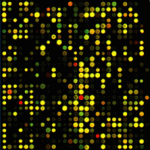Genomics
|
2 december 2019 21:03:01 |
| Deep profiling and custom databases improve detection of proteoforms generated by alternative splicing [METHOD] (Genome Research) |
|
Tweet Alternative pre-mRNA splicing has long been proposed to contribute greatly to proteome complexity. However, the extent to which mature mRNA isoforms are successfully translated into protein remains controversial. Here, we used high-throughput RNA sequencing and mass spectrometry (MS)–based proteomics to better evaluate the translation of alternatively spliced mRNAs. To increase proteome coverage and improve protein quantitation, we optimized cell fractionation and sample processing steps at both the protein and peptide level. Furthermore, we generated a custom peptide database trained on analysis of RNA-seq data with MAJIQ, an algorithm optimized to detect and quantify differential and unannotated splice junction usage. We matched tandem mass spectra acquired by data-dependent acquisition (DDA) against our custom RNA-seq based database, as well as SWISS-PROT and RefSeq databases to improve identification of splicing-derived proteoforms by 28% compared with use of the SWISS-PROT database alone. Altogether, we identified peptide evidence for 554 alternate proteoforms corresponding to 274 genes. Our increased depth and detection of proteins also allowed us to track changes in the transcriptome and proteome induced by T-cell stimulation, as well as fluctuations in protein subcellular localization. In sum, our data here confirm that use of generic databases in proteomic studies underestimates the number of spliced mRNA isoforms that are translated into protein and provides a workflow that improves isoform detection in large-scale proteomic experiments. |
| 489 viewsCategory: Bioinformatics, Genetics, Genomics |
 Identifying gene function and module connections by the integration of multispecies expression compendia [METHOD] (Genome Research) Identifying gene function and module connections by the integration of multispecies expression compendia [METHOD] (Genome Research)AIDE: annotation-assisted isoform discovery with high precision [METHOD] (Genome Research) 
|
| blog comments powered by Disqus |
MyJournals.org
The latest issues of all your favorite science journals on one page
The latest issues of all your favorite science journals on one page



